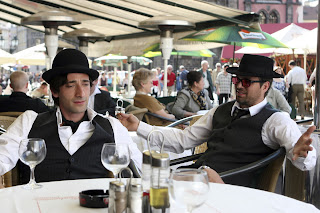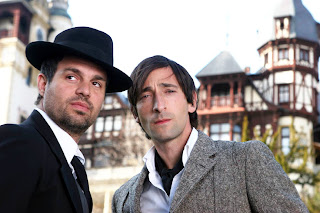As most of you know, I'm now writing for some other sites across the web. But my thoughts on Bloom might be considered "too much" for the breezy atmosphere of the film blogs out there, so I figured I'll post it here, where I know you all can handle it. Fair warning, though - some of my thoughts might be considered a little...much. Even so, I wanted somewhere to post them in case somebody wants to check them out - so why not use my own blog? Good idea, I think I will.
Revisiting The Brothers Bloom: An Analytical Retrospective
"He writes his cons the way dead Russians write novels, with thematic arcs and embedded symbolism and sh*t.” - Bloom, The Brothers Bloom
Although this quote refers to his brother, Stephen, Bloom just as easily could have been referring to Rian Johnson himself, the writer/director of the ambitiously brilliant The Brothers Bloom. The film was released in theaters in May of 2009 and has recently become available for rent on DVD/Blu-ray. I thought I'd take a minute and explore some of the more interesting aspects of the film, straying from the typical “plot summary recap” a lot of movie blogs publish.
Spoilers For The Brothers Bloom Coming Up
Let's jump right into it, shall we? Johnson does a spectacular job of creating necessary separation between his characters, allowing the audience to experience the events of the film through Bloom's perspective. Even after a life spent as a con man, Bloom seems out of his league when it compared to his scheming brother, Stephen, and their partner Bang Bang. This distinction is presented to us in numerous ways throughout the movie.
In one example, we see Stephen walk up the stairs in Montenegro to inform his brother of their “last con.” As he walks up the stairs, Stephen passes by a deck of stacked playing cards on a table and spreads them out as he climbs past. To me, this is a physical representation of Stephen's entire purpose – laying things out and looking at the big picture. Planning is a skill Bloom doesn't have difficulty comprehending, but rather executing (evidenced by his younger self getting caught up in Stephen's “cave” con in the opening scene).
Second, during the conversation in which Stephen convinces Bloom to partake in their last con, we see the gag from the trailer where Bloom has trouble pouring sugar into his coffee. Flustered, he gives up. Not missing a beat, Stephen calmly takes the same sugar and adds some to his drink with no problem. Exasperated, Bloom tries again, only to have the lid pop off and the contents of the container dump into his drink. Stephen is on a different level than Bloom and seemingly possesses a greater mastery over the world they inhabit. Soon after the sugar incident, the brothers sit in a bar and Stephen coolly catches a fly out of mid-air without a second thought.
Johnson indicates that Stephen and Bang Bang are intellectual equals through their on-screen interactions together. Those two always seem like more of a pair than the actual brothers, communicating (mostly visually) through a style all their own and understanding each other perfectly. I can't think of a better example of this than during the introduction of Penelope's mansion. As Stephen explains his plan, he pulls back a tree branch and Bang Bang produces a retractable saw to remove it for him. No one questions why Bang Bang thought to bring a saw, and the saw itself is never seen or mentioned again - it's this level of interaction that Bloom simply does not participate in. It's also why these moments work as humorous quirks rather than mundane routine; if every character did things like that all the time, it would take away from the overall effect. Johnson understands this (obviously better than anyone) and uses great restraint in leaving Bloom close to the action, but simultaneously distanced enough to where the audience has the ideal vantage point to the group's situations.
The introduction of Penelope to the gang's ranks sparks a vastly different reaction from the three con artists. Bloom eventually falls in love with her after questioning whether she is one of Stephen's characters. Stephen himself seems overwhelmed if not outmatched by Penelope's intellect and straightforwardness. Penelope has no problem calling Stephen out multiple times over the course of the film, whether it be his thinly veiled reference to Melville's “The Confidence Man” or the fake death in Mexico near the film's climax. This obviously puts the mastermind slightly on edge. Bang Bang, however, seems to find a friend and confidant in Penelope, giving her a cell number that she hasn't even given Bloom.
The nearly-universal criticism of the movie is at the tonal shift in the third act. Inspired by Penelope's mysterious escape from police custody, Bloom has an epiphany that allows him to embrace his relationship with her. He steals an apple (without his brother's influence, presumably for the first time), giddily robs a snack cart on a train, and is legitimately happy for the first time in his life. After Penelope sees through the staged death in Mexico, Bloom retreats to Montenegro again, this time to protect Penelope by not letting her participate in their cons any longer.
While this section of the film may be the weakest for Bloom, I think it's the strongest for Stephen. Stephen's life goal has always been to tell a story so well, it fulfills itself. He achieves his own prophecy from earlier in the film, when he tells Bloom, “The day I con you is the day I die.” The relationship between Stephen and Bloom is strange; Bloom tells his brother he loves him twice as the movie progresses, but Stephen never returns the expression. Stephen sees the brothers almost as a single entity. In an early scene, Bloom says "You're a genius, Stephen," to which the elder brother replies, "No. We're a genius."
In their final scene together, Stephen finally pulls off “the best trick [Bloom's] ever seen.” Bloom wishes Stephen had a bigger audience to witness it, but Stephen responds, “You're the only audience I've ever needed.” For Stephen, the consummate entertainer, this is the biggest compliment he could give anyone. For his whole life, he's been trying to grant his brother the only thing he's ever wanted – real love – and in Penelope, he sees the chance to give it to him. Stephen's death is the ultimate sacrifice and act of love for Bloom, and only after Bloom sees the brown blood on his shirt does he realize what his brother has done for him. It's Penelope who finally tells Bloom she loves him, granting his need for reciprocal love and helping him move on after Stephen's death.
Penelope: You can make a pinhole camera out of anything hollow and dark.
Bloom: It's gotta warp the image though, right?
Penelope: Yeah. Yeah, it does. I mean, that's what's good about it. I mean, you could point this baby at the most menial, everyday little thing, like the fabric or your...your face or anything, and depending on how the camera eats the light, it's going to be warped and peculiar and imperfect and odd, and it's not going to be reproduction. It's storytelling.
Bloom: It's a lie that tells the truth.
This brief exchange early in the movie serves as Rian Johnson's definitive statement on the nature of film, and gives us a look into his personal viewpoints on the medium through which he's built his career. “A lie that tells the truth.” Johnson creates just that with The Brothers Bloom – personal storytelling involving love, family, loyalty, and sacrifice. These themes aren't unique, but the way Johnson conveys them cements him at the top of my “must watch” directors and I look forward to future journeys through his cinematic worlds. Until next time...





1 comment:
this is so cool! I'm so glad you said that about this movie... about having to watch it more than once... because after I watched it, I knew I liked it, but knew I didn't "get" it all... I mean I understand the storyline obviously- I just feel like there was more to it than what I saw just watching it once...
you'll be happy to know I didn't read all of your original review before I watched the movie... so I'm gonna go do that now... before I read the follow-up... :D